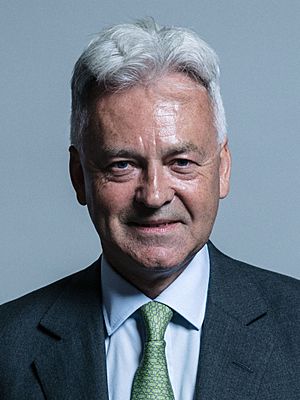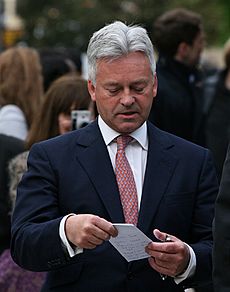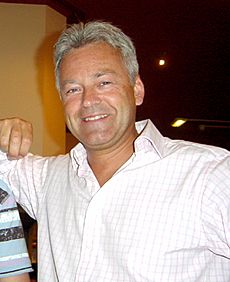Alan Duncan facts for kids
Quick facts for kids
Sir Alan Duncan
|
|||||||||||||||||||||||||||||||||||||||||||||||||||||||||||||||||
|---|---|---|---|---|---|---|---|---|---|---|---|---|---|---|---|---|---|---|---|---|---|---|---|---|---|---|---|---|---|---|---|---|---|---|---|---|---|---|---|---|---|---|---|---|---|---|---|---|---|---|---|---|---|---|---|---|---|---|---|---|---|---|---|---|---|

Official portrait, 2017
|
|||||||||||||||||||||||||||||||||||||||||||||||||||||||||||||||||
| Minister of State for Europe and the Americas | |||||||||||||||||||||||||||||||||||||||||||||||||||||||||||||||||
| In office 15 July 2016 – 22 July 2019 |
|||||||||||||||||||||||||||||||||||||||||||||||||||||||||||||||||
| Prime Minister | Theresa May | ||||||||||||||||||||||||||||||||||||||||||||||||||||||||||||||||
| Preceded by | David Lidington | ||||||||||||||||||||||||||||||||||||||||||||||||||||||||||||||||
| Succeeded by | Chris Pincher | ||||||||||||||||||||||||||||||||||||||||||||||||||||||||||||||||
| Minister of State for International Development | |||||||||||||||||||||||||||||||||||||||||||||||||||||||||||||||||
| In office 13 May 2010 – 14 July 2014 |
|||||||||||||||||||||||||||||||||||||||||||||||||||||||||||||||||
| Prime Minister | David Cameron | ||||||||||||||||||||||||||||||||||||||||||||||||||||||||||||||||
| Preceded by | Gareth Thomas | ||||||||||||||||||||||||||||||||||||||||||||||||||||||||||||||||
| Succeeded by | Desmond Swayne | ||||||||||||||||||||||||||||||||||||||||||||||||||||||||||||||||
|
|||||||||||||||||||||||||||||||||||||||||||||||||||||||||||||||||
| Member of Parliament for Rutland and Melton |
|||||||||||||||||||||||||||||||||||||||||||||||||||||||||||||||||
| In office 9 April 1992 – 6 November 2019 |
|||||||||||||||||||||||||||||||||||||||||||||||||||||||||||||||||
| Preceded by | Michael Latham | ||||||||||||||||||||||||||||||||||||||||||||||||||||||||||||||||
| Succeeded by | Alicia Kearns | ||||||||||||||||||||||||||||||||||||||||||||||||||||||||||||||||
| Personal details | |||||||||||||||||||||||||||||||||||||||||||||||||||||||||||||||||
| Born |
Alan James Carter Duncan
31 March 1957 Rickmansworth, Hertfordshire, England |
||||||||||||||||||||||||||||||||||||||||||||||||||||||||||||||||
| Political party | Conservative | ||||||||||||||||||||||||||||||||||||||||||||||||||||||||||||||||
| Spouse | James Dunseath | ||||||||||||||||||||||||||||||||||||||||||||||||||||||||||||||||
| Alma mater | |||||||||||||||||||||||||||||||||||||||||||||||||||||||||||||||||
Sir Alan James Carter Duncan (born 31 March 1957) is a former British politician. He was a member of the Conservative Party. For many years, he served as a Member of Parliament (MP) for the area of Rutland and Melton, from 1992 to 2019.
During his career, he held important government jobs. He was the Minister of State for International Development from 2010 to 2014. Later, he served as the Minister of State for Europe and the Americas from 2016 to 2019.
Before becoming a politician, Duncan worked in the oil industry for the company Royal Dutch Shell. He was first elected to the House of Commons in 1992. When the Conservative Party was not in power, he held several senior roles in the Shadow Cabinet. This is a team of politicians from the main opposition party who "shadow" the government's ministers.
In 2005, he tried to become the leader of the Conservative Party but withdrew because he did not have enough support. The winner, David Cameron, later made him the Shadow Secretary of State for Trade and Industry.
When Theresa May became Prime Minister in 2016, she appointed Duncan as a minister working with the Foreign Secretary, Boris Johnson. Duncan resigned from this role in 2019.
Contents
Early life and education
Alan Duncan was born in Rickmansworth, Hertfordshire. His father was a wing commander in the RAF, and his mother was a teacher. Because of his father's job, his family moved around a lot, living in places like Gibraltar, Italy, and Norway.
Duncan went to St John's College, Oxford. There, he was elected President of the Oxford Union, a famous debating society. At Oxford, he became friends with Benazir Bhutto, who would later become the Prime Minister of Pakistan. He also studied at Harvard University in the United States on a special scholarship.
Career before politics
After university, Duncan worked as an oil trader for Royal Dutch Shell and another company called Marc Rich. He worked in London and Singapore. Later, he started his own consulting business, using his knowledge to advise governments on oil supplies.
He became successful after helping Pakistan get oil during the Gulf War, when its usual supply was cut off.
Political career
Duncan became active in the Conservative Party in 1979. He supported John Major in his successful campaign to become Prime Minister in 1990.
Member of Parliament
In 1992, Duncan was elected as the Member of Parliament for Rutland and Melton, a safe seat for the Conservative Party. He was re-elected many times until he stepped down in 2019.
Early in his career, he was a member of the Social Security Select Committee. He also worked as a Parliamentary Private Secretary, an assistant to a government minister. In 1995, he famously performed a citizen's arrest on a protester who threw paint and flour at a senior politician.
After the Conservatives lost the 1997 election, Duncan helped William Hague become the new party leader. As a reward, Hague gave him important jobs inside the party.
Working in the Shadow Cabinet
Over the years, Duncan held many senior positions for the Conservative Party while it was in opposition. These are called "shadow" roles, where a politician follows the work of a specific government department. He was the Shadow Health Minister and later the Shadow Secretary of State for several departments, including Transport and Business.
In 2009, there was a controversy about how MPs claimed money for their expenses. Duncan made some comments that were filmed without his knowledge and caused a stir. He apologized, and after a discussion with party leader David Cameron, he was moved to a different role as Shadow Minister for Prisons.
Minister in the Government
After the 2010 general election, the Conservatives formed a government. Prime Minister David Cameron made Duncan the Minister of State for International Development. In this role, he was in charge of the UK's efforts to help other countries. For his work, he was made a Knight Commander of the Order of St Michael and St George in 2014. This is a special honour given by the Queen.
In 2016, Prime Minister Theresa May brought him back into government as the Minister for Europe and the Americas. He worked as a deputy to the Foreign Secretary, Boris Johnson. He resigned in 2019, just before Johnson became Prime Minister.
Libyan oil cell
During the conflict in Libya in 2011, Duncan played a key part in a secret plan. He helped create a special team called the "Libyan oil cell." This team's job was to stop fuel supplies from reaching the forces of the Libyan leader, Colonel Gaddafi.
The team advised NATO to block ports and worked with oil traders to get fuel to the rebel forces instead. This clever plan helped weaken Gaddafi's army without causing as much damage as bombing.
Political views
Duncan is often described as a libertarian. This means he believes in individual freedom and thinks the government should not interfere too much in people's lives or the economy. He is seen as a "moderniser" in the Conservative Party.
He has written books about his political ideas. In one book, he argued that the government should only be responsible for essential services like defence and policing.
During the 2016 Brexit referendum, he supported the 'Remain' campaign, which wanted the UK to stay in the European Union.
Personal life
In 2002, Duncan became the first sitting Conservative MP to publicly state that he is gay. In 2008, he entered into a civil partnership with his partner, James Dunseath. This made him the first member of a Cabinet or Shadow Cabinet to do so.
He has been a strong supporter of gay rights. He helped shape the Conservative Party's positive response to the law that created civil partnerships in the UK.
See also
 In Spanish: Alan Duncan para niños
In Spanish: Alan Duncan para niños
 | Selma Burke |
 | Pauline Powell Burns |
 | Frederick J. Brown |
 | Robert Blackburn |



